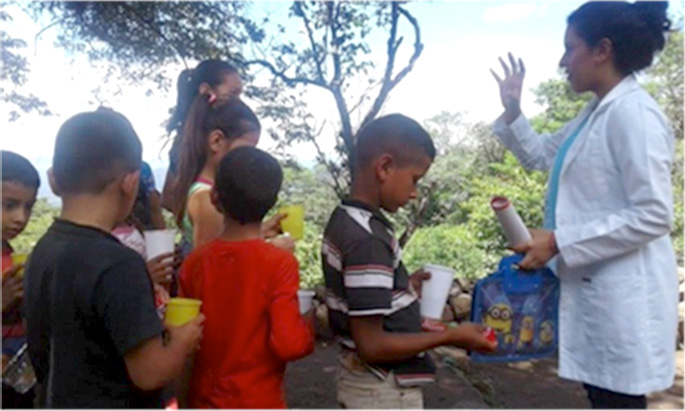
Oct 21, 2016 | Focolare Worldwide, Senza categoria
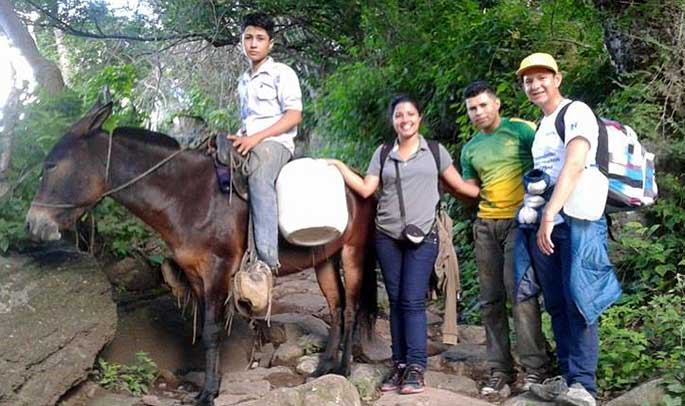 Selfless giving and receiving was the experience of the Youth for a United World from Managua, Nicaragua, during their visit to the small Focolare community of La Cal, a village that rises 1200 metres above sea level near the coffee capital of Jinotega. Armed with some bags of clothing, food, medicinals and toys that were all gathered by the community in Managua, they reached Jinotega after a 3-hour bus ride. Then they drove for 8 km in a pick-up until the road became too rough to travel on. It was still another kilometre and a half through a forest fraught with stones, crevasses and deep slopes that made the trek impossible even for the horses, and the young people had to continue on foot. “You could never imagine the wonderful welcome we received,” the young people report. The village of La Cal was in unstable condition. Its wooden houses teeming with children were without electricity, running water or medical supplies. There was a small shop in the village with some basic relief-items, a small school with one classroom, one teacher and a tiny chapel for when a pricst arrived for Mass. If not for the solar panels that were recently installed, the whole village would be in complete darkness.
Selfless giving and receiving was the experience of the Youth for a United World from Managua, Nicaragua, during their visit to the small Focolare community of La Cal, a village that rises 1200 metres above sea level near the coffee capital of Jinotega. Armed with some bags of clothing, food, medicinals and toys that were all gathered by the community in Managua, they reached Jinotega after a 3-hour bus ride. Then they drove for 8 km in a pick-up until the road became too rough to travel on. It was still another kilometre and a half through a forest fraught with stones, crevasses and deep slopes that made the trek impossible even for the horses, and the young people had to continue on foot. “You could never imagine the wonderful welcome we received,” the young people report. The village of La Cal was in unstable condition. Its wooden houses teeming with children were without electricity, running water or medical supplies. There was a small shop in the village with some basic relief-items, a small school with one classroom, one teacher and a tiny chapel for when a pricst arrived for Mass. If not for the solar panels that were recently installed, the whole village would be in complete darkness.  There were also two medical doctors with the Youth for a United World. One of them, a dentist who began the day with a presentation on oral hygiene to thirty children who so happy to use a tooth brush and toothpaste for the first time in their lives. At lunchtime one family wanted to offer some very warm and delicious tortillas, as the young people gathered the small children for games. In the afternoon presentations were offered for adults on parasite prevention. The very intense day concluded with a reading of the Word of Life, a deep spiritual moment that enveloped everyone. We were all very moved when an elderly man wished to give his blessing to the young people. This was followed by the distribution of goods that the young people had brought for them. They were offered an ex-chicken coop to sleep in that night. “It was so moving for us,” they write, “to spend the night in an ex-chicken coop just like the men in the first focolare whose house was an ex-chicken coop. In the morning, after a good breakfast that had been prepared by the women of the village, we were invited to return again soon and left for Jinotega. We went to the cathedral to thank God for the experience that had changed us so much, that had allowed us know such generous people who live their daily struggle with such dignity and joy of knowing God’s immense love for them – and for having had constructed in the midst of those mountains another small piece of universal brotherhood.”
There were also two medical doctors with the Youth for a United World. One of them, a dentist who began the day with a presentation on oral hygiene to thirty children who so happy to use a tooth brush and toothpaste for the first time in their lives. At lunchtime one family wanted to offer some very warm and delicious tortillas, as the young people gathered the small children for games. In the afternoon presentations were offered for adults on parasite prevention. The very intense day concluded with a reading of the Word of Life, a deep spiritual moment that enveloped everyone. We were all very moved when an elderly man wished to give his blessing to the young people. This was followed by the distribution of goods that the young people had brought for them. They were offered an ex-chicken coop to sleep in that night. “It was so moving for us,” they write, “to spend the night in an ex-chicken coop just like the men in the first focolare whose house was an ex-chicken coop. In the morning, after a good breakfast that had been prepared by the women of the village, we were invited to return again soon and left for Jinotega. We went to the cathedral to thank God for the experience that had changed us so much, that had allowed us know such generous people who live their daily struggle with such dignity and joy of knowing God’s immense love for them – and for having had constructed in the midst of those mountains another small piece of universal brotherhood.”
Oct 19, 2016 | Focolare Worldwide, Senza categoria
Representatives of the Brazilian Methodist Church and the Baptist Church of the Philippines will also attend. The head moderator will be Cardinal Francis X. Kriengsak Kovithavanij, Archbishop of Bangkok. The theme chosen for this year: “Jesus crucified and abandoned as the basis of a spirituality of communion,” in an atmosphere of fraternal communion and reconciliation, in the context of the 500th anniversary celebration of the Reform. The meeting’s agenda will include theological and spiritual discourses in the light of the spirituality of the Focolare, liturgical celebrations of the various Christian traditions and many sessions of exchange and communion among the participants. Moreover, they will visit the Dachau concentration camp and some important sites of the Reform. An important moment will be the ecumenical rite in the Church of St. Anne in Augsburg on 26 October. The celebration will focus on the memorial of the “Joint Declaration on the Doctrine of Justification” with which the Catholic Church and the Worldwide Lutheran Federation had put an end to mutual judgements and anathemas. On Thursday, 27 October, the bishops will be received by the Mayor of Augsburg, Dr. Kurt Gribl.
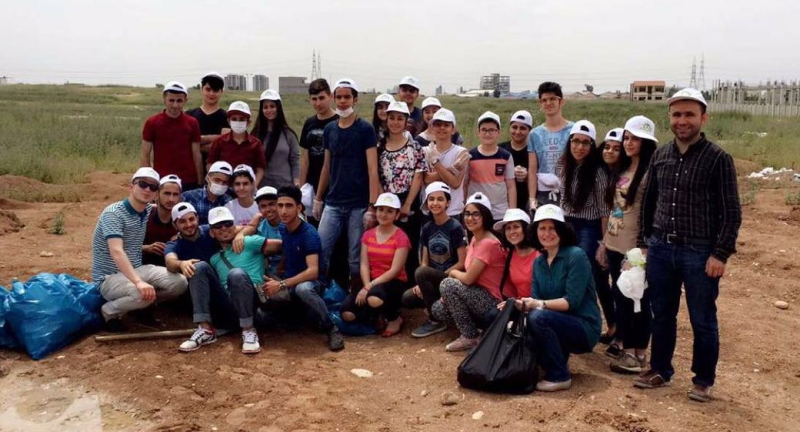
Oct 13, 2016 | Focolare Worldwide
 Political instability, economic uncertainty, corruption, religious extremism, and reduction of educational offers are just some of the causes that push the Iraqi population to an unprecedented migration. The choice to remain in Iraq today is a really difficult decision, especially if you are a Christian. And yet Iraq disposes of remarkable natural resources and its people are endowed with humanity and great inclusion capacities. Just think of the plurality of the cultures, languages, and religions, and the various ethnic groups which for centuries had managed to coexist in peace. The habitat of Christian legacy right at its origins, for 2,000 years Iraq has been the natural home to very lively Christian communities. With the outbreak of wars, however, today it has become the object of discrimination and persecution. The most atrocious even was two years ago, when the ISIS extremists took over Mossul and the surrounding plains: in a few hours thousands of Christians had to abandon their homes. With only the clothes they were wearing, they had to disperse amid numberless dangers and discomforts, towards Jordan or Lebanon where they found refuge in makeshift refugee camps. Some statistics say that the Christians in Iraq counted 1.5 million (2003), and today number 300,000. Also the Focolare community has suffered the devastating effects of this barbarity. But both those who left the country and those who remained – concentrated in the cities of Erbil, Baghdad, Bassura, and Dohuk – try to transmit peace everywhere, building bridges of solidarity. However, while in the typical summer meetings of the Focolare in the past, the Mariapolis saw the participation of 400 people, and in those held from 9 to 11 September this year, only 40 attended. But the numerical drop has not influenced the qualitative profile which has definitely grown in intensity and depth, also because the central theme focused on interpersonal relationships undertaken in the spirit of mercy. Hosted in Sulaymaniya, close to the border with Iran, the participants lived three days of an authentic training in mutual love. Racconta Rula, focolarina from Jordan and now in the focolare house of Erbil: «We prayed, played, took walks in a family atmosphere, experiencing real communion. During the session dedicated to the family, the spirit of sharing created allowed us to talk about relationships as couples, the challenge of migration, conciliation of work and family, education of the children… while the youths, through choreographies, showed how one we can become bridges towards the others.» The Mariapolis was also visited by the Bishop of Baghdad, Bishop Salomone, who inflamed all with his words: «Jesus wants us to become yeast for this world. I am pleased that you chose this city for your meeting, and even if you are only a few, you will surely leave in this place that typical imprint of those who are seriously committed to living the Gospel.» The focolare tries to support those who have remained, as also those who have decided to leave, precisely because they are aware of the difficulties of living without being able to plan one’s future, especially for the youth. «We see that albeit the fact of living abroad – continues Rula – they still want to remain in contact. A young boy wrote us from the refugee camp, saying that the spirituality of unity is the only light that is his support and that trying to love others gives a meaning to the unnerving wait they are undergoing.» Among the many experiences shared in the Mariapolis, is the emblematic one of a surgeon in a public hospital. Since the doctors do not receive their salaries regularly, they try to plan the operations for the afternoon, when these are private and paid operations. But he decided to help as many people as possible by scheduling the appointments in the morning. At first, his colleagues criticized him, but slowly they began to do the same.
Political instability, economic uncertainty, corruption, religious extremism, and reduction of educational offers are just some of the causes that push the Iraqi population to an unprecedented migration. The choice to remain in Iraq today is a really difficult decision, especially if you are a Christian. And yet Iraq disposes of remarkable natural resources and its people are endowed with humanity and great inclusion capacities. Just think of the plurality of the cultures, languages, and religions, and the various ethnic groups which for centuries had managed to coexist in peace. The habitat of Christian legacy right at its origins, for 2,000 years Iraq has been the natural home to very lively Christian communities. With the outbreak of wars, however, today it has become the object of discrimination and persecution. The most atrocious even was two years ago, when the ISIS extremists took over Mossul and the surrounding plains: in a few hours thousands of Christians had to abandon their homes. With only the clothes they were wearing, they had to disperse amid numberless dangers and discomforts, towards Jordan or Lebanon where they found refuge in makeshift refugee camps. Some statistics say that the Christians in Iraq counted 1.5 million (2003), and today number 300,000. Also the Focolare community has suffered the devastating effects of this barbarity. But both those who left the country and those who remained – concentrated in the cities of Erbil, Baghdad, Bassura, and Dohuk – try to transmit peace everywhere, building bridges of solidarity. However, while in the typical summer meetings of the Focolare in the past, the Mariapolis saw the participation of 400 people, and in those held from 9 to 11 September this year, only 40 attended. But the numerical drop has not influenced the qualitative profile which has definitely grown in intensity and depth, also because the central theme focused on interpersonal relationships undertaken in the spirit of mercy. Hosted in Sulaymaniya, close to the border with Iran, the participants lived three days of an authentic training in mutual love. Racconta Rula, focolarina from Jordan and now in the focolare house of Erbil: «We prayed, played, took walks in a family atmosphere, experiencing real communion. During the session dedicated to the family, the spirit of sharing created allowed us to talk about relationships as couples, the challenge of migration, conciliation of work and family, education of the children… while the youths, through choreographies, showed how one we can become bridges towards the others.» The Mariapolis was also visited by the Bishop of Baghdad, Bishop Salomone, who inflamed all with his words: «Jesus wants us to become yeast for this world. I am pleased that you chose this city for your meeting, and even if you are only a few, you will surely leave in this place that typical imprint of those who are seriously committed to living the Gospel.» The focolare tries to support those who have remained, as also those who have decided to leave, precisely because they are aware of the difficulties of living without being able to plan one’s future, especially for the youth. «We see that albeit the fact of living abroad – continues Rula – they still want to remain in contact. A young boy wrote us from the refugee camp, saying that the spirituality of unity is the only light that is his support and that trying to love others gives a meaning to the unnerving wait they are undergoing.» Among the many experiences shared in the Mariapolis, is the emblematic one of a surgeon in a public hospital. Since the doctors do not receive their salaries regularly, they try to plan the operations for the afternoon, when these are private and paid operations. But he decided to help as many people as possible by scheduling the appointments in the morning. At first, his colleagues criticized him, but slowly they began to do the same.
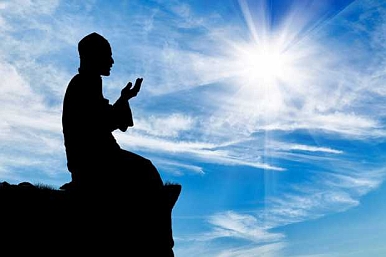
Oct 10, 2016 | Focolare Worldwide
 “We’ve known Khalid for more than ten years. One day he rang our doorbell to sell us something, but he mostly wanted to find a job. He had been in Italy for over a year, an illegal immigrant with nowhere to live. He was 24 years old and was from Morocco where he had left behind his mother, a widow with two children. A week later he came back. “I was hungry and you gave me something to eat … I was a stranger and you welcomed me” … The words of Jesus seemed to be calling out to us. In the afternoon we invited him to work in the flower garden and in the vegetable garden. In this way he was able to send a small amount of money to his mother. It was the first time he was able to help his family, and it made him happy. I got to work finding him a job, but the answer was always the same: he’s an illegal, we can’t hire him. Finally, I found him some seasonal work at an agriculture business. He worked nights an dslept with an Indian in a container: he had a hard life, but was happy. One day the telephone rang: his Indian friend told us that Khalid was not feeling well. Jesus was still calling: we went to visit him and took him to a docgtor who agreed to see him. He had a serious ear infection that needed care. We decided to take him in and let him share our son’s bedroom. Sometimes we had to wake up during the night to care for him. Our children were also quite caring towards him. The one who had given him work didn’t intend to obtain legal documents for him. We had become the last hope he could hold on to. The Lord asked us for an even more radical act of love. So we decided to hire Khalid as a domestic, and later the idea came of taking him and letting him stay at our house like another son. We let him some areas of the house for himself so that he could be independent. We respected his religious practices in preparing meals and scheduling around his prayers, especially during Ramadan. This brought our dialogue to a religious level. Our relationship became closer and closer. We spent time together in the evenings discussing our lives and his, along with our traditions. Difficulties and doubts were not lacking, but together with the help of the Focolare community that never failed to support us we found the strength to continue on. Providence was never lacking. A gentleman that we didn’t even know gave us a motorbike which we handed on to Khalid. People from the Movement provided clothing…. Then a job was found that allowed Khalid to help his family and to pay us back for some of the support we had provided for him. Around seven months later a house was left vacant where he could move with some of his friends. Then he went back to Morocco where he married. He returned to Italy with his wife, found a permanent job and is living a serene life. They had three children, two of which go to elementary school. A nice friendship was built with his wife even though she has trouble with the language. One day she wanted to show her gratitude by preparing a totally Moroccan meal at our house for us, which we enjoyed with our children. We’ve become the grandparents of their children who come to our house often! In our sharing with them we continually experience the joy of God’s presence among us.” (G.- Mantova, Italy)
“We’ve known Khalid for more than ten years. One day he rang our doorbell to sell us something, but he mostly wanted to find a job. He had been in Italy for over a year, an illegal immigrant with nowhere to live. He was 24 years old and was from Morocco where he had left behind his mother, a widow with two children. A week later he came back. “I was hungry and you gave me something to eat … I was a stranger and you welcomed me” … The words of Jesus seemed to be calling out to us. In the afternoon we invited him to work in the flower garden and in the vegetable garden. In this way he was able to send a small amount of money to his mother. It was the first time he was able to help his family, and it made him happy. I got to work finding him a job, but the answer was always the same: he’s an illegal, we can’t hire him. Finally, I found him some seasonal work at an agriculture business. He worked nights an dslept with an Indian in a container: he had a hard life, but was happy. One day the telephone rang: his Indian friend told us that Khalid was not feeling well. Jesus was still calling: we went to visit him and took him to a docgtor who agreed to see him. He had a serious ear infection that needed care. We decided to take him in and let him share our son’s bedroom. Sometimes we had to wake up during the night to care for him. Our children were also quite caring towards him. The one who had given him work didn’t intend to obtain legal documents for him. We had become the last hope he could hold on to. The Lord asked us for an even more radical act of love. So we decided to hire Khalid as a domestic, and later the idea came of taking him and letting him stay at our house like another son. We let him some areas of the house for himself so that he could be independent. We respected his religious practices in preparing meals and scheduling around his prayers, especially during Ramadan. This brought our dialogue to a religious level. Our relationship became closer and closer. We spent time together in the evenings discussing our lives and his, along with our traditions. Difficulties and doubts were not lacking, but together with the help of the Focolare community that never failed to support us we found the strength to continue on. Providence was never lacking. A gentleman that we didn’t even know gave us a motorbike which we handed on to Khalid. People from the Movement provided clothing…. Then a job was found that allowed Khalid to help his family and to pay us back for some of the support we had provided for him. Around seven months later a house was left vacant where he could move with some of his friends. Then he went back to Morocco where he married. He returned to Italy with his wife, found a permanent job and is living a serene life. They had three children, two of which go to elementary school. A nice friendship was built with his wife even though she has trouble with the language. One day she wanted to show her gratitude by preparing a totally Moroccan meal at our house for us, which we enjoyed with our children. We’ve become the grandparents of their children who come to our house often! In our sharing with them we continually experience the joy of God’s presence among us.” (G.- Mantova, Italy)
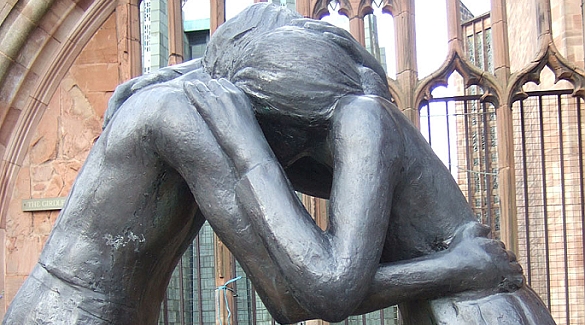
Oct 8, 2016 | Focolare Worldwide

Photo: Reconciliation by Josefina de Vasconcellos at Coventry Cathedral
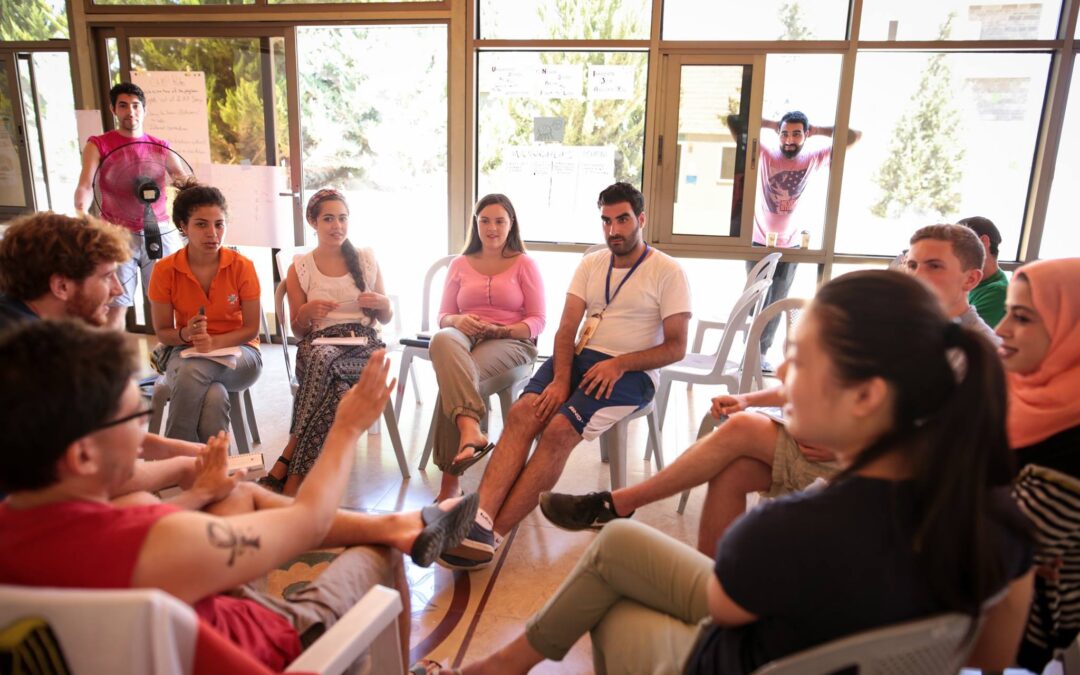
Oct 4, 2016 | Focolare Worldwide
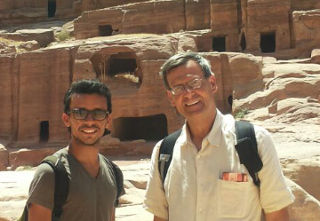
Marco Desalvo (right)
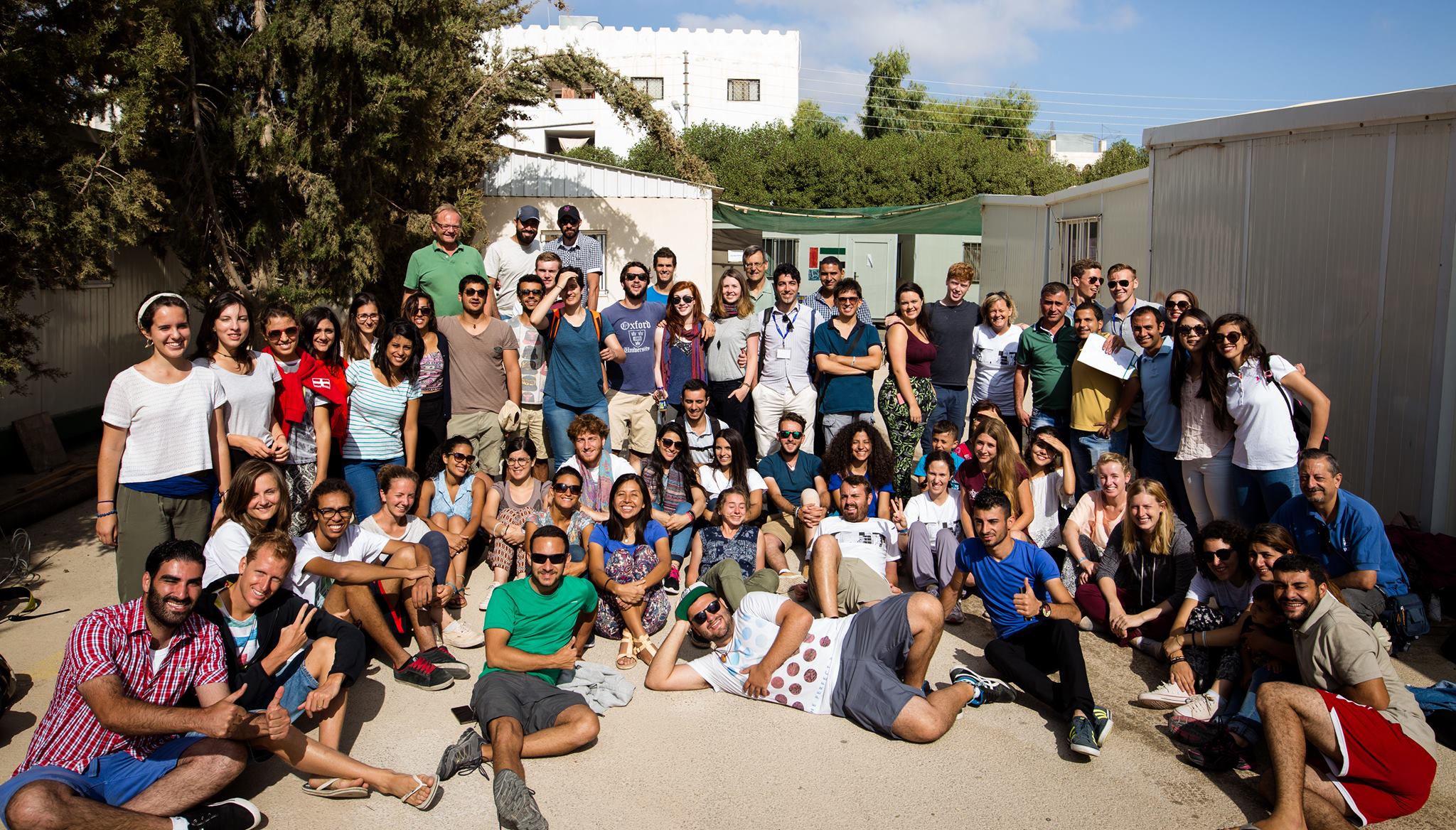 The president of New Humanity admits being very struck by the volunteers from Caritas Jordan: “Irreplaceable, precious, discreet, source of hope, of life of concrete love, medicine for everyone they meet.” Without them thousands of refugees would not have a roof over their heads and the means to survive – to find hope. Working with them we touched with our own hands the deepest meaning of the word ‘Caritas’: concrete love. Two weeks ago I was in Poland at the World Youth Day, and the message of Pope Francis to the two million young people is still fresh in my mind: ‘Don’t retire at the age of 25, [….] don’t be couch potatoes […] aim high. […] They might be able to judge you dreamers because you believe in a new humanity that does not accept hatred among peoples, that does not see borders between countries as barriers, and that preserves its own traditions without egoism and resentment. Don’t be discouraged! With your smiles and your open arms you preach hope and are a blessing for the human family.” Here in Jordan I’ve met young people who put these words in practice. Their work is certainly a small drop in front of the problems we’re facing. But with young people like them, the world will change. These days have turned us into ambassadors of the refugees, of their suffering, of a world of Peace.”
The president of New Humanity admits being very struck by the volunteers from Caritas Jordan: “Irreplaceable, precious, discreet, source of hope, of life of concrete love, medicine for everyone they meet.” Without them thousands of refugees would not have a roof over their heads and the means to survive – to find hope. Working with them we touched with our own hands the deepest meaning of the word ‘Caritas’: concrete love. Two weeks ago I was in Poland at the World Youth Day, and the message of Pope Francis to the two million young people is still fresh in my mind: ‘Don’t retire at the age of 25, [….] don’t be couch potatoes […] aim high. […] They might be able to judge you dreamers because you believe in a new humanity that does not accept hatred among peoples, that does not see borders between countries as barriers, and that preserves its own traditions without egoism and resentment. Don’t be discouraged! With your smiles and your open arms you preach hope and are a blessing for the human family.” Here in Jordan I’ve met young people who put these words in practice. Their work is certainly a small drop in front of the problems we’re facing. But with young people like them, the world will change. These days have turned us into ambassadors of the refugees, of their suffering, of a world of Peace.” 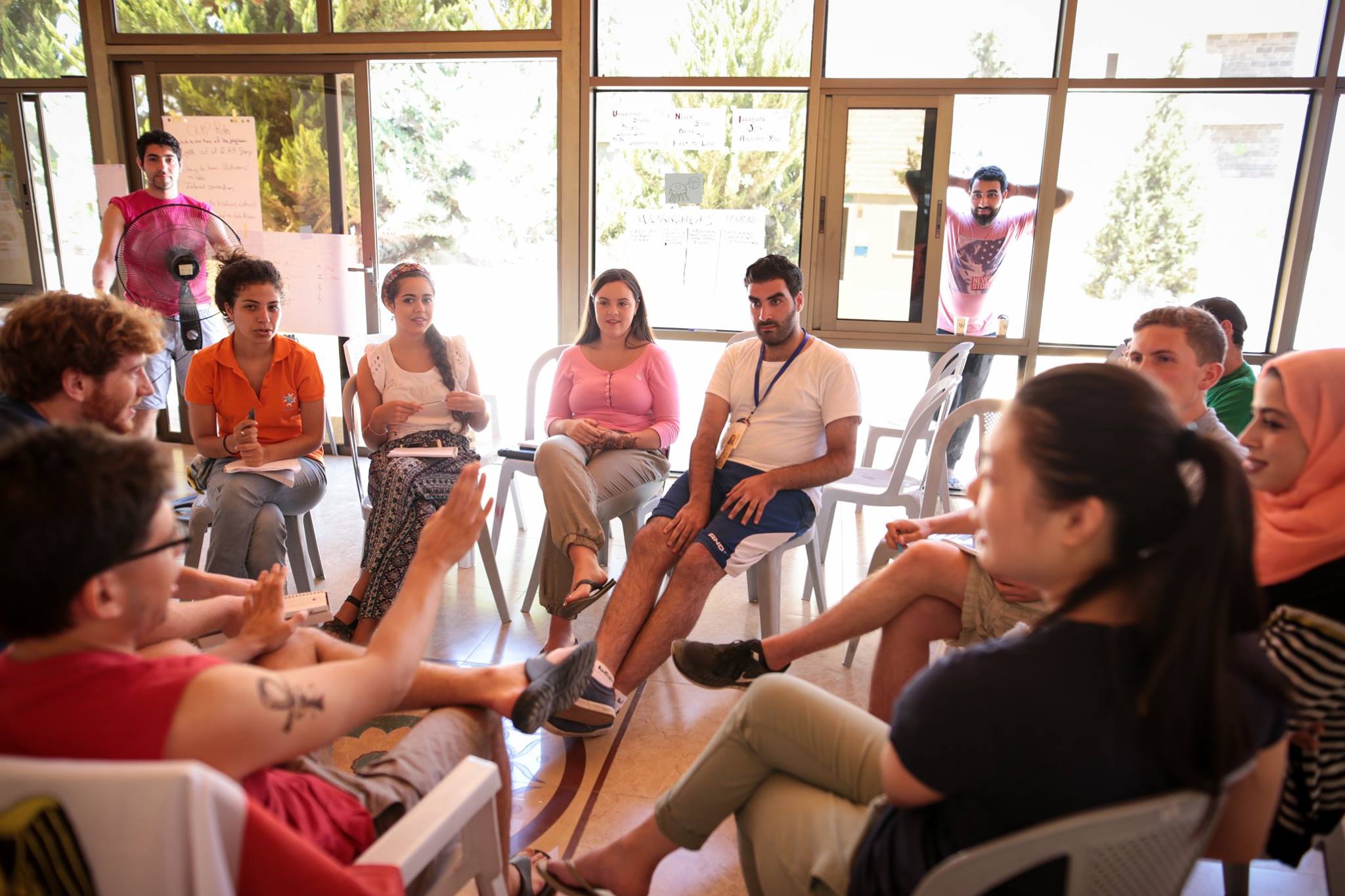 The Host Spot Project is promoted by New Humanity and other associations from nine countries, and is co-financed by the Erasmus+ programme. The objective: to spread a culture of human rights. These are young people from different backgrounds, ready to acquire the knowledge and skills to defend the right of freedom of expression and to be engaged in producing documentaries that tell the life stories of the refugees. After Jordan, the project is planning on a March 2017 training course in Germany to develop the technical skills needed to produce social documentaries. There will be the meeting with refugees in German refugee camps, and different forms of welcome will be compared. See also: Volunteerism in the refugee camps of Jordan Facebook: www.facebook.com/hostspot9/
The Host Spot Project is promoted by New Humanity and other associations from nine countries, and is co-financed by the Erasmus+ programme. The objective: to spread a culture of human rights. These are young people from different backgrounds, ready to acquire the knowledge and skills to defend the right of freedom of expression and to be engaged in producing documentaries that tell the life stories of the refugees. After Jordan, the project is planning on a March 2017 training course in Germany to develop the technical skills needed to produce social documentaries. There will be the meeting with refugees in German refugee camps, and different forms of welcome will be compared. See also: Volunteerism in the refugee camps of Jordan Facebook: www.facebook.com/hostspot9/

 Selfless giving and receiving was the experience of the Youth for a United World from Managua, Nicaragua, during their visit to the small Focolare community of La Cal, a village that rises 1200 metres above sea level near the coffee capital of Jinotega. Armed with some bags of clothing, food, medicinals and toys that were all gathered by the community in Managua, they reached Jinotega after a 3-hour bus ride. Then they drove for 8 km in a pick-up until the road became too rough to travel on. It was still another kilometre and a half through a forest fraught with stones, crevasses and deep slopes that made the trek impossible even for the horses, and the young people had to continue on foot. “You could never imagine the wonderful welcome we received,” the young people report. The village of La Cal was in unstable condition. Its wooden houses teeming with children were without electricity, running water or medical supplies. There was a small shop in the village with some basic relief-items, a small school with one classroom, one teacher and a tiny chapel for when a pricst arrived for Mass. If not for the solar panels that were recently installed, the whole village would be in complete darkness.
Selfless giving and receiving was the experience of the Youth for a United World from Managua, Nicaragua, during their visit to the small Focolare community of La Cal, a village that rises 1200 metres above sea level near the coffee capital of Jinotega. Armed with some bags of clothing, food, medicinals and toys that were all gathered by the community in Managua, they reached Jinotega after a 3-hour bus ride. Then they drove for 8 km in a pick-up until the road became too rough to travel on. It was still another kilometre and a half through a forest fraught with stones, crevasses and deep slopes that made the trek impossible even for the horses, and the young people had to continue on foot. “You could never imagine the wonderful welcome we received,” the young people report. The village of La Cal was in unstable condition. Its wooden houses teeming with children were without electricity, running water or medical supplies. There was a small shop in the village with some basic relief-items, a small school with one classroom, one teacher and a tiny chapel for when a pricst arrived for Mass. If not for the solar panels that were recently installed, the whole village would be in complete darkness.  There were also two medical doctors with the Youth for a United World. One of them, a dentist who began the day with a presentation on oral hygiene to thirty children who so happy to use a tooth brush and toothpaste for the first time in their lives. At lunchtime one family wanted to offer some very warm and delicious tortillas, as the young people gathered the small children for games. In the afternoon presentations were offered for adults on parasite prevention. The very intense day concluded with a reading of the Word of Life, a deep spiritual moment that enveloped everyone. We were all very moved when an elderly man wished to give his blessing to the young people. This was followed by the distribution of goods that the young people had brought for them. They were offered an ex-chicken coop to sleep in that night. “It was so moving for us,” they write, “to spend the night in an ex-chicken coop just like the men in the first focolare whose house was an ex-chicken coop. In the morning, after a good breakfast that had been prepared by the women of the village, we were invited to return again soon and left for Jinotega. We went to the cathedral to thank God for the experience that had changed us so much, that had allowed us know such generous people who live their daily struggle with such dignity and joy of knowing God’s immense love for them – and for having had constructed in the midst of those mountains another small piece of universal brotherhood.”
There were also two medical doctors with the Youth for a United World. One of them, a dentist who began the day with a presentation on oral hygiene to thirty children who so happy to use a tooth brush and toothpaste for the first time in their lives. At lunchtime one family wanted to offer some very warm and delicious tortillas, as the young people gathered the small children for games. In the afternoon presentations were offered for adults on parasite prevention. The very intense day concluded with a reading of the Word of Life, a deep spiritual moment that enveloped everyone. We were all very moved when an elderly man wished to give his blessing to the young people. This was followed by the distribution of goods that the young people had brought for them. They were offered an ex-chicken coop to sleep in that night. “It was so moving for us,” they write, “to spend the night in an ex-chicken coop just like the men in the first focolare whose house was an ex-chicken coop. In the morning, after a good breakfast that had been prepared by the women of the village, we were invited to return again soon and left for Jinotega. We went to the cathedral to thank God for the experience that had changed us so much, that had allowed us know such generous people who live their daily struggle with such dignity and joy of knowing God’s immense love for them – and for having had constructed in the midst of those mountains another small piece of universal brotherhood.”






